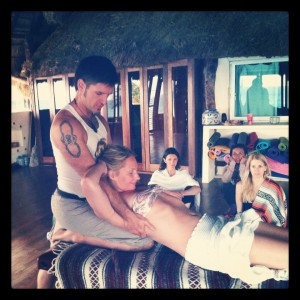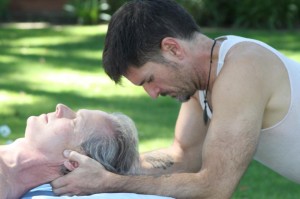Mark Haviland is a physical therapist, healer, masseuse and alternative health practitioner based in San Francisco, CA. In his business he deals often the elderly, they infirm and the dying, employing touch- and motion-based therapy to lift spirits and ease tensions. He spoke with SevenPonds about his experience in the field.
Antal: Could you start off by telling us a about your work in alternative health, physical therapy? How does your field relate to the end-of-life?
Mark: I’ve been practicing in the healing arts for about 12 years now, and there are many different facets to the practice that I’ve cultivated over the years. I started off as a volunteer at an AIDS hospice in San Francisco. I had to get really up close and personal with the regulars, I spent time right at their bedside. I started studying with the volunteers, and it changed my life in many ways, going into that area of service, with others like rabbis, clerics, teachers. You know, people who work in the hospice field or with the elderly, patients who have taken trauma, those who need emotional release in grief. I learned that it’s really so challenging for people to take care of themselves.
I’ve been doing grief and growing practice for about 16 years. At Beyond Body Work we have about 5 to 6 therapy sessions with everyone together. We train them, and give them family grieving attention. We have morning conferences. We learn that the body is a record-keeper, a space that stores grief. In hospice situations we teach people simple things, like holding hands, movement, and that the most important part is a sense of intention, making a claim from your heart, and make the ailing person more at ease if they’re feeling unbalanced, locating their physical meridians.
I lost my mom about 3 years ago to a brain tumor, and I don’t care how prepared you think you are, you aren’t. It was a beautiful, annihilating experience. I have regrets. My family and I, we weren’t there for her ourselves.
Antal: So how can people take care of themselves when they’re in those sorts of situations?
Mark: I taught a class called Temple Keeper, which was a self-care class with several elderly clients who received regular work — we taught them massage, stretches, points they can hold on their body, their wrist, their arm, ankle or chest, that can help alleviate stress. This field is changing, there is this huge wave of taking personal responsibility. People want to take care of themselves. I teach people stretches, Tai Gong, this sort of internal martial art, similar to Tai Chi, it’s simple and gentle. I like to keep it simple in general: stretches, yoga. Energy follows intention, so the intent you have can help to have a calming effect.
Antal: Tell us more about this. How do you deal with patients with terminal illness?
Mark: Very delicately. I had a client, just today actually, going into chemo. This person is dynamic, ambitious, full of life force, and I hadn’t gone specifically through this sort of training. A lot of it is knowing what to do, what not to do, and sometimes just putting your hand on someone, holding them, serves as a perception shifter to help them alleviate their own experience. Having a space for trust and bonding with their therapist is good enough. Several clients had cancer. I’ve had clients who died, have had growths taken out. Ultimately I’ve found that it’s touch — intentional, healing touch. You can’t do a lot for people taking poison into their bodies, like in chemotherapy, so knowing where to stop is self-regulating. It’s something that can’t really be taught, that you feel out.
Antal: How can someone make the most of your service, or in the time in between sessions? How about those who maybe have trouble even with the most basic physical tasks?
 Mark: Okay, say you’re someone who is very overweight, housebound, weighs between 300 and 400 pounds. You aren’t able to leave your house, so I have to be very functional in the work that I would normally have them do. So we practice with movement and music, any sort of movement in the body. The body loves rhythm and movement. When you’re going through the experience of not being well, when your spirit’s low, a lot of times it’s about reaching out, and there are a lot of resources out there. But reaching out is one of the hardest things to do. Some people see it as a defeat, acknowledging your own limitations.
Mark: Okay, say you’re someone who is very overweight, housebound, weighs between 300 and 400 pounds. You aren’t able to leave your house, so I have to be very functional in the work that I would normally have them do. So we practice with movement and music, any sort of movement in the body. The body loves rhythm and movement. When you’re going through the experience of not being well, when your spirit’s low, a lot of times it’s about reaching out, and there are a lot of resources out there. But reaching out is one of the hardest things to do. Some people see it as a defeat, acknowledging your own limitations.
Vigorously rubbing your joints, your skin — polishing your body induces circulation and energy and blood flow, your immune system. Patting your legs and chest is helpful for your autoimmune and your lymph system. There are hundreds of thousands of other basic activities you can partake.
Antal: Do you have any advice for those who are emotionally ill? Who are grieving?
Mark: There’s this great book out there called Kayak Mornings that I recommend those going through that process. See, grief comes all at once, and we expect it to leave all at once, but that’s not how it works. We have to live with it. We develop a relationship with grief and we learn skills, ways to take care of ourselves and to deal with it, and its tendency to come in these overwhelming waves. There is a connection between life and death, but unfortunately there is hardly any discussion on death in this society.
You are looking life right in the face when seeing someone die. It is a spiritual, visceral experience. Everybody dies differently, everyone grieves differently, everyone has their own experience. There is help out there, and you have to reach out. Death and grieving may seem extraordinarily isolating, but in fact they create space for humanity.
Antal: That’s exactly what SevenPonds thinks about it. Thanks so much for your time.
Mark: Absolutely, keep up the good work.
You can reach Mark at his San Francisco office by phone: (415) 596-4293.
- Take in SevenPonds’ review of the work on life and grief that Mark mentioned, Kayak Mornings, by Roger Rosenblatt.
- Learn how one San Francisco organization buoys the spirits of its clients through animal companionship.

 How Can Healing Physical Therapy Help? An Interview with Mark Haviland
How Can Healing Physical Therapy Help? An Interview with Mark Haviland



 Passing of Beloved Comedian Births a New Comedy Festival
Passing of Beloved Comedian Births a New Comedy Festival

 The Spiritual Symbolism of Cardinals
The Spiritual Symbolism of Cardinals















I used to work at a physical therapy clinic in college. I really like how you point out how many exercises must be patient based and unique to them. That really helps them progress in the best way possible. Thanks for sharing this interview.
Report this comment